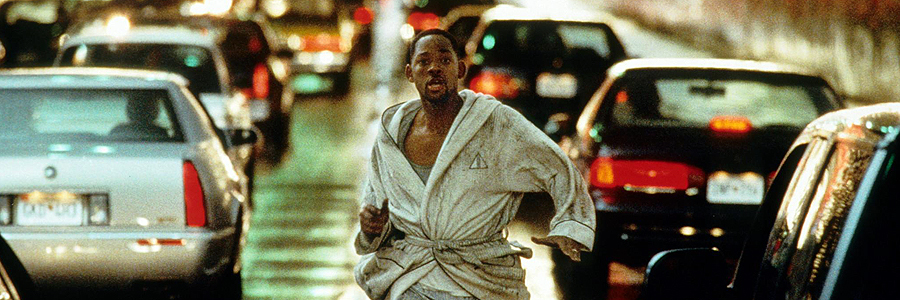
Enemy Of The State
Touchstone Pictures
Original release: November 20th, 1998
Running time: 131 minutes
Director: Tony Scott
Writer: David Marconi
Composer: Harry Gregson-Williams
Cast: Will Smith, Gene Hackman, Jon Voight, Jason Robards, Jason Lee
I’m not planning on blowing up the country. 00:27:22 to 00:29:12
Deconstructing Cinema: One Scene At A Time, the complete series so far
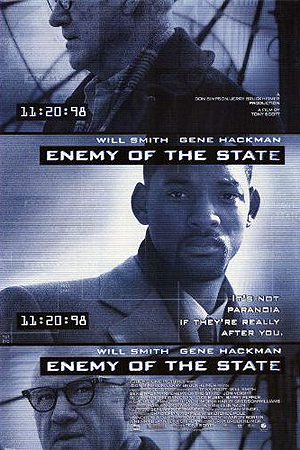
“They who can give up essential liberty to obtain a little temporary safety, deserve neither liberty nor safety.” ~ Benjamin Franklin ¹
The presence of surveillance in our daily lives has become something of an accepted intrusion. We go about our work without giving it a second thought. From the moment we leave our homes in the morning to when we return in the evenings; I often wonder how many times a day our images have been captured on close circuit television cameras fitted on street corners, coffee shops, train stations, supermarkets and who knows where else. Should we feel this constant watchful eye might be too much we’re always assured it’s for our own safety and protection – yet who’s watching it all and does it really prevent crime?
In the 1998 film Enemy Of The State the idea of constant surveillance is more than just a theme, it’s a major plot mechanism that’s used to tell the story of a government who wants more surveillance over its citizens, but in the end this watchful eye leads to their own undoing when it’s used against them.
At the start of the film we see National Security Agency official Thomas Reynolds (Jon Voight) paying a visit to Congressman Phil Hammersley (Jason Robards) to convince him to support the passage of a new piece of legislation, the Telecommunications Security and Privacy Act, that would significantly expand the surveillance powers of intelligence agencies. Hammersley however remains opposed to it, believing that it’s not just the first step in a surveillance society but is the surveillance society, and as a result he’s killed. The murder, made to look like a suicide, is captured in full on a video camera set up across the lake by wildlife researcher Daniel Zavitz (Jason Lee).
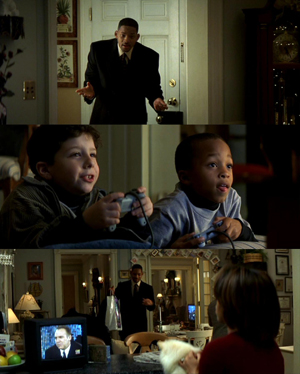
When Zavitz goes through the footage some time later he sees the murder and in his attempt to get it to an underground journalist he shows up on Reynolds’ radar. As Reynolds’ team mobilises to intercept Zavitz from passing the video disc to the journalist he goes on the run and just by chance he bumps into an old friend from college. Robert Clayton Dean (Will Smith) is successful lawyer with a wife, Carla Dean (Regina King), a kid, a beautiful home and he’s living the American dream, but during his encounter with Zavitz he gets passed the disc without even realising it. Moments later the wildlife researcher is lying dead on a busy road after being hit by a fire truck and Clayton becomes the next person of interest to Reynolds.
What then follows is Reynolds and the NSA doing everything they can think of to retrieve the disc before Robert discovers what’s on it, or even worse, goes public with it. This includes raiding his house and planting surveillance, using his past affair with fellow lawyer Rachel Banks (Lisa Bonet) to cause a strain his marriage and having him fired from his job. This is all to alienate him, make him feel desperate and finally cave in to the pressure and give up the disc, but early on in the film there’s an interesting conversation Robert has with his wife in the kitchen when he comes home. Carla’s watching an interview with Congressman Albert and Larry King on TV.
… and freedom have always existed in a very precarious balance. And when buildings stop blowing up, people’s priorities tend to change…
ROBERT:
He’s got a point there, sweetie!
CARLA:
Bobby!!!
ROBERT:
I mean, who is this idiot?
CARLA:
He’s talking about ending personal privacy. Do you want your phone tapped?
ROBERT:
I’m not planning on blowing up the country.
CARLA:
How do we know until we’ve heard all of your dirty little secrets?
ROBERT:
You’re just gonna have to trust me!
CARLA:
Ohh… I know, we’ll just tap the criminals; we’ll won’t suspend the civil rights of the good people.
ROBERT:
Right!
CARLA:
Then who decides which is which?
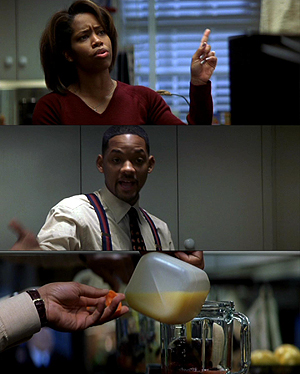
It’s this conversation which brings the focus back to us as citizens in a surveillance society and helps us realise that once such a piece of legislation is in place then we’ve effectively given up our rights to privacy. Not only that, but this dialogue between Robert and Carla also highlights the problems that arise when we strip away at civil liberties regardless of any distinction between the criminals and the good people. Whatever happened to innocent until proven guilty? This doesn’t seem to apply anymore and Enemy Of The State is a film which shows you can be guilty of whatever crime if the state chooses to say so.
In this scene we also see how reliant Robert and his family are on the consumer lifestyle they have. The kid’s playing computer games with a friend when his father gets home, meanwhile Carla’s deeply focused on the television in the kitchen and Robert busies himself with getting fruit from the fridge to start mixing in his blender. Each of these actions show that while they live under the disguise of free will they still have the right to have and hold commodities. It’s when that right is threatened that Robert takes a stand (in morally questionable ways, it must be said), in doing so he begins to fight for his consumer lifestyle, as well as his privacy against a state that will let have one if he gives up the other.
- [1] Memoirs of the Life and Writings of Benjamin Franklin (1818)
- [2] Strange Love: Or How We Learn to Stop Worrying and Love the Market (2001). Rowman & Littlefield Publishers
- [3] How Patriotic is the Patriot Act?: Freedom Versus Security in the Age of Terrorism (2004), Routledge
Such is the case with the USA Patriot Act (Uniting (and) Strengthening America (by) Providing Appropriate Tools Required (to) Intercept (and) Obstruct Terrorism Act of 2001), a controversial piece of legislation that was passed by President George W. Bush on October 26, 2001 following the September 11th attacks. The Patriot Act gave law enforcement greater power in gathering intelligence, but in doing so it also stripped away at civil liberties under the disguise of increased protection. Although made some years prior to the September 11th attacks, Enemy Of The State parallels a lot of the same arguments we saw for and against such legislature and the dialogue between Robert and Carla is the best example of that.
“True patriots thus realise that one must protect the nation from all enemies, foreign and domestic, and that the essence of what it means to be patriotic is to protect our Constitution and its Bill of Rights with all our might.” ³
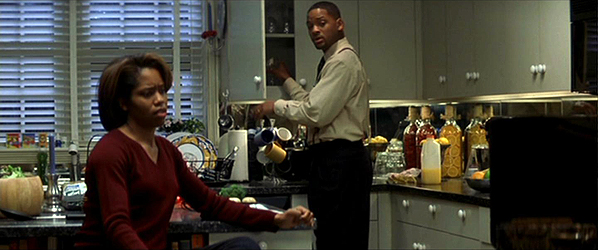

Patrick Samuel
The founder of Static Mass Emporium and one of its Editors in Chief is an emerging artist with a philosophy degree, working primarily with pastels and graphite pencils, but he also enjoys experimenting with water colours, acrylics, glass and oil paints.
Being on the autistic spectrum with Asperger’s Syndrome, he is stimulated by bold, contrasting colours, intricate details, multiple textures, and varying shades of light and dark. Patrick's work extends to sound and video, and when not drawing or painting, he can be found working on projects he shares online with his followers.
Patrick returned to drawing and painting after a prolonged break in December 2016 as part of his daily art therapy, and is now making the transition to being a full-time artist. As a spokesperson for autism awareness, he also gives talks and presentations on the benefits of creative therapy.
Static Mass is where he lives his passion for film and writing about it. A fan of film classics, documentaries and science fiction, Patrick prefers films with an impeccable way of storytelling that reflect on the human condition.
© 2022 STATIC MASS EMPORIUM . All Rights Reserved. Powered by METATEMPUS | creative.timeless.personal. | DISCLAIMER, TERMS & CONDITIONS
HOME | ABOUT | CONTACT | TWITTER | GOOGLE+ | FACEBOOK | TUMBLR | YOUTUBE | RSS FEED
CINEMA REVIEWS | BLU-RAY & DVD | THE EMPORIUM | DOCUMENTARIES | WORLD CINEMA | CULT MOVIES | INDIAN CINEMA | EARLY CINEMA
MOVIE CLASSICS | DECONSTRUCTING CINEMA | SOUNDTRACKS | INTERVIEWS | THE DIRECTOR’S CHAIR | JAPANESE CINEMA





